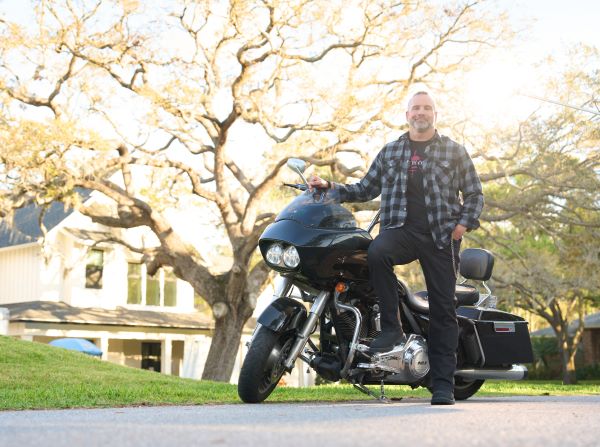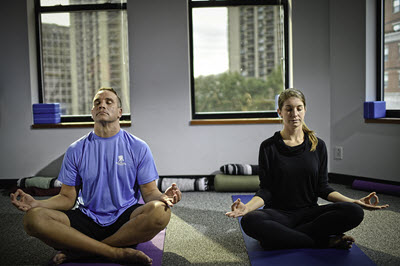A Decade of Healing: Life Beyond PTSD

“Life has changed quite drastically,” says Army veteran Bill Geiger, reflecting on the 10 years since he decided to get help for his post-traumatic stress disorder (PTSD).
“Back then, I was angry, depressed, anxious, the whole spectrum of emotions. I was withdrawn from my family. But in my mind, I was fine.”
The days of isolation and denial are now behind him.
Bill found the help he needed through Wounded Warrior Project® and Warrior Care Network®, a treatment program that offers care for veterans living with PTSD and other mental health challenges. Since 2015, the network’s four medical partners have helped thousands of veterans feel better faster and heal long term.
Warrior Care Network gave Bill the tools to heal and the hope to start living again. Today, the father of two is enjoying life with his family and experiencing what once seemed impossible.
Bill’s story shows how love, hard work, and faith can lead to a fulfilling life beyond PTSD.
From Darkness to Decision
As a military police officer, Bill witnessed many traumatic events on the job. Though he often felt angry and on edge, Bill says those qualities were an advantage during his service.
But after returning home from his second deployment, things began to unravel. The weight of his memories became overwhelming. Constant irritability, hypervigilance, and isolation led to fractures in his life.
Bill admits, “It wasn’t until I found out how badly my emotions were affecting my family that I realized something was wrong. I had to figure out what it was.”
Understanding PTSDBill’s experience reflects what many post-9/11 veterans face. WWP’s Warrior Survey* shows mental health conditions are among the most common issues tied to military service:
|
But at the time, Bill didn’t know where to turn.
“Up until then, all I really knew was the VA. I went to the VA, saw counselors, and took lots of medicine. That’s all that was available at that time,” he says.
For years, he took anti-anxiety medication just to get out the door. “That was my routine — pills and work. I didn’t know there might be other ways to get help. I thought that was as good as it gets.”
But in the fall of 2015, “I learned there was something else.”
‘Sometimes, You Have to Trust Something New’
Recognizing the need to advance the treatment of veteran mental health, WWP established Warrior Care Network in 2015. The program is a collaboration with four academic medical centers — Emory Healthcare Veterans Program, Home Base (Massachusetts General Hospital), Operation Mend (UCLA Health), and the Road Home Program (RUSH) — aimed at helping veterans heal from the disruptive effects of PTSD, anxiety, depression, substance use, and sleep issues. Participants receive personalized mental health and wellness care at no cost.
A fellow veteran encouraged Bill to look into the program. Though familiar with WWP and its events, Bill was skeptical about mental health treatment.
“You think, ‘I’ve tried so many things — why bother?’ But sometimes, you just have to trust something new.”

Holistic activities and clinical care are part of Warrior Care Network.
That fall, desperate to change his life, Bill took a leap of faith. He became one of the first veterans to participate in the Warrior Care Network program at Massachusetts General Hospital’s Home Base.
Over two weeks, Bill confronted his past trauma in a structured environment that combined therapy with holistic activities such as mindfulness, movement, creative expression, peer connection, and family involvement.
“The amount of research and planning that went into the program — I’d never seen anything like it,” Bill recalls. “At Warrior Care Network, they weren’t just doing medicine or just counseling. It was a whole‑body and mind approach. I learned new coping skills and strategies, and found camaraderie with other veterans who all had similar experiences. It was eye-opening.”
He still laughs at the memory of his first tai chi class, where he discovered drumming, a rhythmic breathing exercise. “I thought, this is really weird. Then a euphoric calm came over me,” he says.
“Sometimes now, I’ll stand in my living room and do drumming. It helps me calm my mind. It’s like flipping a reset switch.”
Learn more about what to expect at Warrior Care Network
Healing That Reaches the Family
One of the core principles of the Warrior Care Network is family education, which helps loved ones understand what’s happening in the brain and how to support their veteran at home.

Today, Bill enjoys spending time with his family, including his wife, Sara, and their two children.
Bill’s wife, Sara, joined virtual workshops that gave her insight into PTSD and her husband’s experiences. She connected with other spouses and gained tools to help her cope and strengthen their relationship.
“Before, it was like me against her,” recalls Bill. “After Warrior Care Network, it became us together trying to handle things. That family part — that understanding — is huge.”
Read more about Sara’s experience with WWP.
New Tools and a New Perspective
When his time at Warrior Care Network came to an end, Bill felt confident about his future. However, he knew that long-term success would require daily effort.
“I couldn’t just go home and expect life to be better. I had to put in the work,” he said. “Warrior Care Network gave me the tools to use, but it’s up to me to use them – even when I don’t think I need them.”
One tool Bill adopted is journaling. Like most people, he began to track the negative. “Then I started tracking good moments. Now I track good hours. I realize maybe the whole week wasn’t awful.”
That shift in mindset is the foundation of his healing. “You see that it does get better. My goal is to keep getting better.”
Looking Forward to the Next Decade of Healing
As Warrior Care Network celebrates its 10th year, WWP remains committed to providing the highest-quality mental and brain health care to veterans. Since 2015, WWP has invested nearly $336 million into Warrior Care Network, which has earned national recognition for clinical excellence. But perhaps its greatest achievement is reflected in veterans like Bill, who rediscovered the joy of living life.
“...sometimes, you just have to trust something new.”
The man who once dreaded crowds and noise now looks forward to family gatherings and traveling with his wife — things that once seemed impossible before Warrior Care Network.
“I used to get anxious before we even packed,” he admits. “Now I know my triggers. I am able to plan ahead to handle them before they handle me.”
Bill also serves as a WWP peer mentor, sharing his experiences to help other veterans realize that healing is possible no matter how much time has passed.
“I dreaded life before. Now, I look forward to living. That’s something I never thought I’d say, but [Warrior Care Network], they taught me tools for life — not just for two weeks.”
Read more about finding post-traumatic growth.
*Warrior Survey, Wave 3 (conducted June 15 - Aug. 24, 2023)
Contact: Cynthia Weiss – Public Relations, cweiss@woundedwarriorproject.org, 904.738.2589
About Wounded Warrior Project
Wounded Warrior Project is our nation’s leading veteran services organization, focused on the total well-being of post-9/11 wounded, ill, or injured veterans. Our programs, advocacy, and awareness efforts help warriors thrive, provide essential lifelines to families and caregivers, and prevent veteran suicides. Learn more about Wounded Warrior Project.


